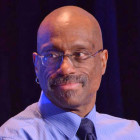 House Speaker Paul Ryan ended up overshadowing his own efforts Tuesday to highlight the Republican Party’s proposals for overhauling aid programs for low-income people by telling reporters that he was still planning to endorse and vote for a presidential candidate that had earlier uttered what he called “the textbook definition of a racist comment.”
House Speaker Paul Ryan ended up overshadowing his own efforts Tuesday to highlight the Republican Party’s proposals for overhauling aid programs for low-income people by telling reporters that he was still planning to endorse and vote for a presidential candidate that had earlier uttered what he called “the textbook definition of a racist comment.”
The Speaker of the House shredding his moral credibility – in the heart of one of Washington D.C.’s historic African-American communities, no less – to remain loyal to Republican presidential candidate Donald Trump was indeed far more worthy of media attention than the ostensible purpose of his crossing the Anacostia River, which was to use a church-based substance abuse treatment center as a backdrop for his effort to rebrand the Party of the 1 Percent as the party that cares the most about the poor.
Nonetheless, the package of proposals that Ryan began unveiling this week, under the branding of “A Better Way,” should not be ignored, even though many of their tenets will be familiar to people who have followed what passes for anti-poverty policy in the conservative movement. What Ryan hopes is that at least Senate and House candidates will use the “Better Way” proposals to give the impression that the Republican Party is more than the “Party of No” and a party that thinks the solution to every economic problem is a tax cut for the wealthy.
People who are interested in a detailed rebuttal of the “Better Way” anti-poverty proposals should refer to the Center for Budget and Policy Priorities, which has posted a series of commentaries on Ryan’s plan.
Much of the analysis is around the ways Ryan and his Republican allies try to avoid the fundamental truth contained in a statement issued Tuesday by Deborah Weinstein of the Coalition for Human Needs: “It costs money to give people the tools to escape poverty” – and Republicans just don’t want to spend that money. Weinstein notes that this year, under Ryan’s leadership, House Republicans proposed cutting low-income programs “by $3.7 trillion over 10 years, mostly in health care, but also cutting [Supplemental Nutritional Assistance Program benefits, commonly known as food stamps] by $150 billion (a 30 percent cut between 2021-2026), and cutting Pell Grants and other low-income education programs.”
There is another familiar theme that will jump out if you look at Ryan’s plan: the insistence that “our welfare system should encourage work-capable welfare recipients to work or prepare for work in exchange for benefits.”
The principle that every person who wants to work should have a job is one that progressives and conservatives could unite around – if conservatives believed that government had a role to play in helping to create the jobs that they are so adamant that people take in lieu of being “dependent on government.”
But there is nothing in the 35-page report on poverty programs and the Republican alternative that speaks to actual job creation. There is a lot of righteous hectoring about how people receiving government assistance – whether it’s the now-rare cash assistance, SNAP benefits, or housing aid. But the section of Washington Ryan chose as the setting for his news conference has an unemployment rate of 12 percent, more than two-and-a-half times the national average.
What the people in the community don’t need is to be lectured about the value of work. They need jobs. And this is where the Republican rhetoric does not match reality, since the Republican Party has dramatically cut spending on every economic development program that would support job creation, ranging from badly needed infrastructure investment to the kinds of economic development programs that enabled communities to improve themselves without the destructive, zero-sum game of gentrification.
Ryan and his party also does not believe that the federal minimum wage should eventually be raised to $15 an hour, so that people who work and raise a family can actually rise above poverty through their wages. It is the double-whammy that renders all of Ryan’s posturing about “a better way” to deal with poverty just that – election-year posturing. It’s just like his attacks on Donald Trump’s “textbook” racism – designed to project an air of moral probity to cover immoral actions.
This blog originally appeared at OurFuture.org on June 7, 2016. Reprinted with permission.
Isaiah J. Poole worked at Campaign for America’s Future. He attended Pennsylvania State University and lives inWashington, DC.

